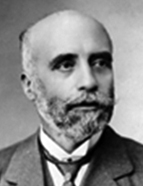

Leite de Vasconcelos attributed his interest in ethnography, archaeology and philology to his birthplace, and a childhood immersed in popular traditions. He was born into a noble family, the grandson of a wealthy doctor and a judge, and lived in Ucanha (Viseu district) until he was three and a half years of age. He attended primary school first at Mondim and then at S. João de Tarouca. He learned French from a relative and Latin from the local priest. He read the Portuguese classics from the family library and learned the basics of English and Italian. He buried himself in solitary readings near churches and ancient ruins.
His parents, José Leite Cardoso de Melo (1810-1881) and Maria Henriqueta Leite Vasconcelos Pereira de Melo (1815-1894) witnessed the decline of the family fortune during the first half of the century. In 1875, at 17, young Leite de Vasconcelos worked for the municipal administration of Mondim and was the only source of family income. He took up employment in Oporto to pay for his education, working intensively and living frugally. Notwithstanding this adverse context, Leite excelled as a student. He completed the Curso de Liceu [Secondary School] at the Colégio de S. Carlos [S. Carlos Private School] (1876-1879), the Curso de Ciências Naturais [Natural Sciences Course] at the Academia Politécnica do Porto [Polytechnic Academy of Oporto] (1879-1881) and the Curso de Medicina [Medical Course] at the Escola Médico-Cirúrgica [School of Medicine and Surgery] (1881-1886). But it was an activity he pursued while studying Medicine which would awaken his true scientific interests. He had cultivated a taste for the compilation of traditions, verses and popular novels since secondary school. In 1878, he penned his first study on ethnography, O Presbitério de Vila Cova [The Presbytery of Vila Cova]. He took up German, which was essential for access to updated bibliographical references.
He engaged actively in the foundation of literary and scientific dissemination journals. Together with Mont’Alverne de Sequeira, he founded O Pantheon: revista de sciencias e lettras [the Pantheon; science and arts journal] (1880-1881). The journal targeted the student population of Oporto and shared both its contents and collaborators with other contemporary journals that disseminated positivism (See Era Nova: revista do movimento contemporâneo [see New Era: contemporary movement journal]. Lisbon, 1880-1881; Positivismo: revista de philosophia [Positivism: philosophy journal]. Oporto, 1878-1882).
